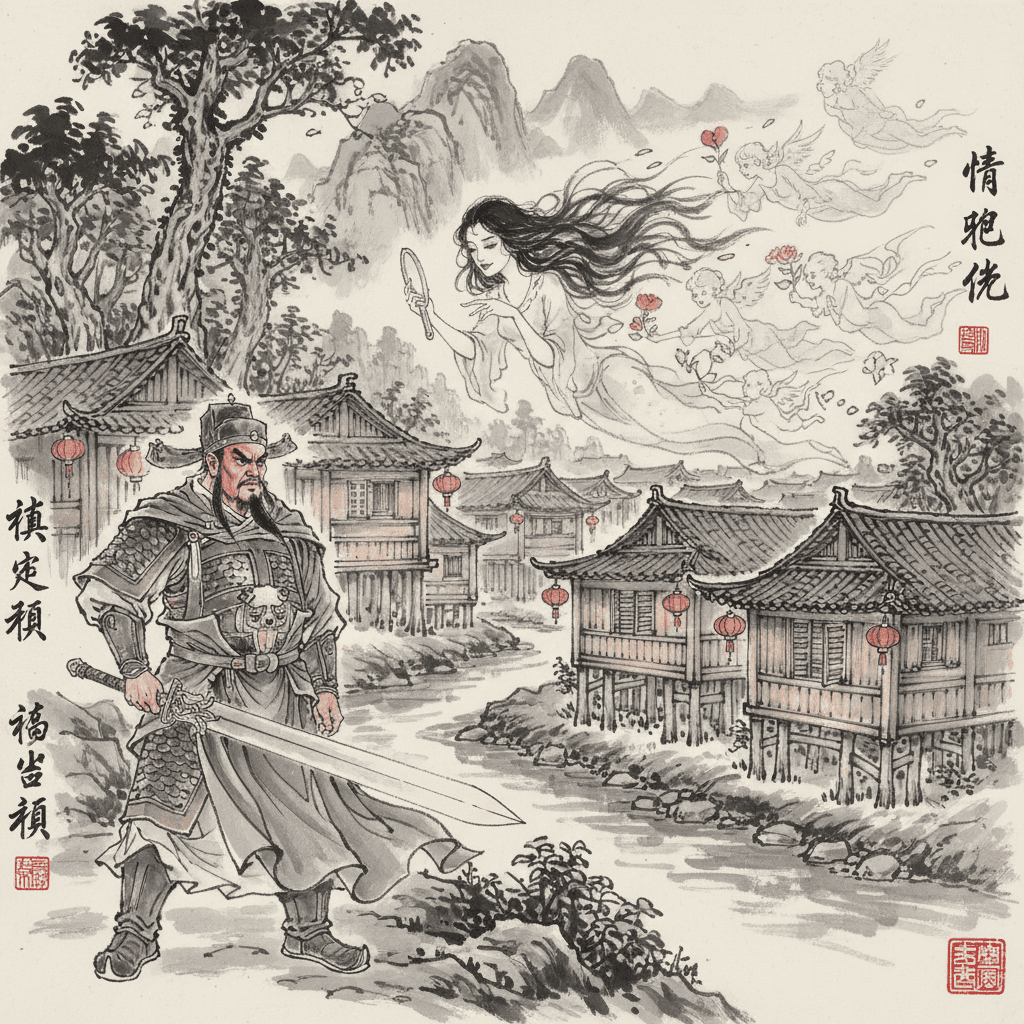The Pacification of Ghosts - Chapter Twelve: The Romantic Ghost Seeks Marriage at Diao Jiao Village
Zhong Kui arrived at Diao Jiao Village (吊角庄), famous for its stilted houses built along the riverside. The architecture, which should have been cha...

Zhong Kui arrived at Diao Jiao Village (吊角庄), famous for its stilted houses built along the riverside. The architecture, which should have been charming, now felt oppressive—every house seemed to lean toward the water as if yearning to throw itself in.
The village elder explained their crisis: "A Romantic Ghost (风流鬼) has been forcing himself as a suitor to every unmarried woman in the village. But worse, he's also approaching married women, young girls, even... even some of the men. He claims all love belongs to him!"
Han Yuan frowned. "A ghost that disrupts marriage bonds could destroy the social fabric entirely."
The Romantic Ghost appeared as an eternally handsome young man, dressed in fine silks that shifted color like oil on water. He carried a qin (古琴) and composed endless love poems—all celebrating himself.
"I am love incarnate!" he declared upon meeting Zhong Kui. "In life, I was so irresistible that people died for my affection. In death, I've become even more perfect!"
Investigation revealed his true history: he had been a narcissistic playboy who destroyed multiple families with his affairs, eventually killed by a coalition of betrayed husbands. His ego couldn't accept this ignoble death, so he reimagined himself as a romantic martyr.
The ghost's method was insidious. He would appear in dreams, making himself seem like the perfect lover—whoever the dreamer most desired. Upon waking, victims would find themselves obsessed with this false image, unable to love their real partners.
"My husband seems like a stranger now," wept one wife. "All I can think about is that beautiful face from my dreams."
A young man added, "I was happily engaged, but now my fiancée seems plain compared to my dream visitor. I know it's wrong, but I can't stop the feelings!"
The Romantic Ghost fed on this artificial devotion, growing stronger with each broken relationship.
The Romantic Ghost proposed a challenge: "If you're so righteous, Judge Zhong Kui, prove that true love is stronger than my illusions! I'll marry the village beauty, and you try to stop me!"
But this was a trap. The "village beauty" he chose was a young woman already engaged to her childhood sweetheart. The ghost intended to destroy their pure love as proof that all affection was shallow.
"She'll forget him the moment she sees my true glory!" the ghost boasted.
Zhong Kui employed a different strategy. Instead of fighting the ghost directly, he revealed its true form—not physically, but emotionally. Using divine insight, he showed everyone what "love" with the Romantic Ghost really meant.
The visions were horrifying: eternal servitude to the ghost's ego, never being truly seen or valued, existing only as a mirror for the ghost's self-admiration. Love with him meant erasure of self, becoming just another trophy in his collection.
"That's not love," the engaged woman declared firmly. "That's decoration. My fiancé sees ME—my flaws, my dreams, my fears. The ghost only sees his own reflection in my eyes."
In an unexpected move, Fu Qu challenged the ghost to seduce him—a battle-hardened warrior with no interest in romance.
"If you're truly irresistible, make me fall in love with you," Fu Qu demanded.
The Romantic Ghost tried every technique—appearing as various beautiful forms, composing epic poems, performing supernatural feats of grace. But Fu Qu remained unmoved.
"You're trying to seduce an image of what you think I want," Fu Qu observed. "You've never actually loved anyone, so you don't understand that real attraction isn't about perfection—it's about connection."
Faced with his first complete failure, the Romantic Ghost began to fracture. His perfect appearance cracked, revealing the insecurity beneath.
"But I'm beautiful! I'm talented! I'm everything anyone could want!" he wailed.
"You're a performance," Zhong Kui corrected. "Real love requires vulnerability, the risk of rejection, the courage to be imperfect. You've never risked anything because you've never been real."
The ghost's form began shifting rapidly—trying on different faces, different personas, desperately seeking one that would work. But the more he changed, the less substantial he became.
Zhong Kui offered the ghost a choice: "You can continue this hollow existence, forcing false love that will never satisfy you. Or you can learn what real affection means—starting by genuinely caring about someone else's happiness above your own attraction to them."
The Romantic Ghost recoiled. "Care about THEIR happiness? But I'm the prize! They should care about MY happiness!"
This response sealed his fate. Zhong Kui bound the ghost to serve as a warning—he would appear to those tempted by shallow attraction, showing them the emptiness of love without substance.
As the ghost was contained, he delivered a spiteful warning: "There's a Reckless Ghost in a wine shop nearby who makes my disruptions look tame. He doesn't just break hearts—he breaks minds!"
Continue reading: Chapter Thirteen: The Reckless Ghost Escapes Through Wine